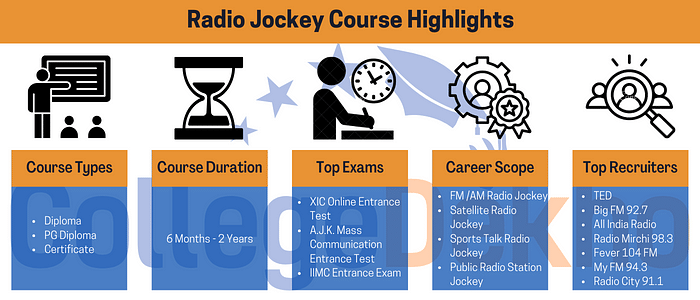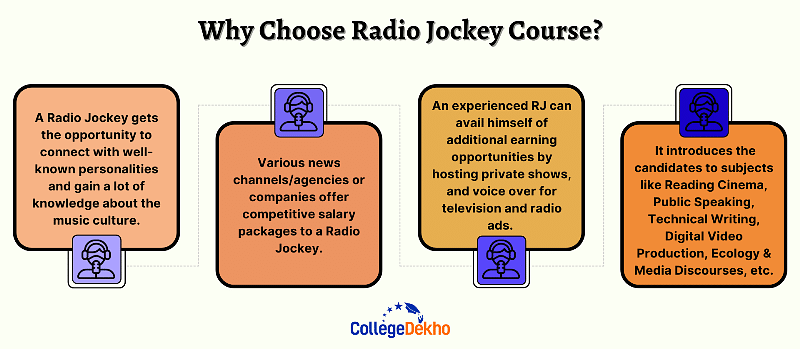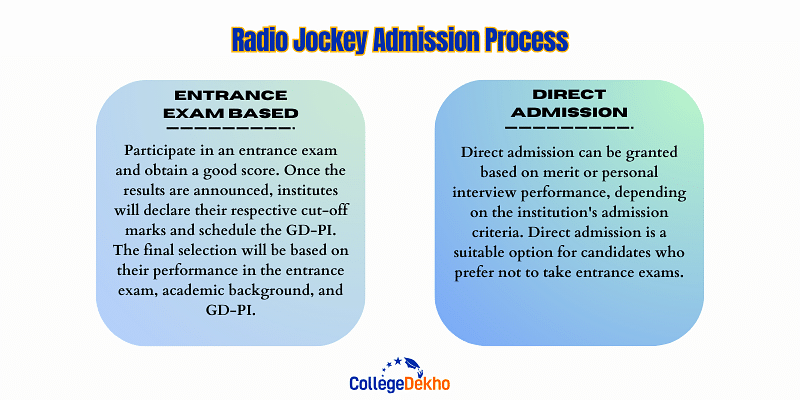Radio Jockey Course
Radio Jockey courses are designed to train individuals in the art and craft of radio presenting. It encompasses a wide range of skills necessary for a career in radio broadcasting, including voice modulation, scriptwriting, hosting shows, interviewing guests, and managing a console. The course also covers aspects of pronunciation, language fluency, and the use of sound equipment. If you have a passion for radio and are looking to develop your communication skills and media knowledge, then go for it!
What is a Radio Jockey Course?
A Radio Jockey course is a specialized training program designed to equip individuals with the skills and knowledge required to pursue a career in radio broadcasting as a Radio Jockey or announcer. These courses cater to individuals with diverse academic backgrounds, offering options at various levels of education, including undergraduate, postgraduate, diploma, or certification levels. The Radio Jockey syllabus covers topics such as Reading Cinema, Public Speaking, Technical Writing, Digital Video Production, Ecology & Media Discourses, etc. Many colleges in India including Xavier Institute of Communication, Jamia Millia Islamia, Indian Institute of Mass Communication, and Symbiosis Centre for Media and Communication offer Radio Jockey courses.
An RJ course is designed to provide comprehensive training and practical experience to aspiring Radio Jockeys, equipping them with the skills, knowledge, and confidence needed to excel in the dynamic field of radio broadcasting. Candidates starting their careers as RJs are offered an average annual package of INR 2 Lakhs to INR 4 Lakhs per annum. After gaining experience, they become eligible for an average compensation of INR 10 Lakhs to INR 15 Lakhs per annum. In this profession, employment opportunities are not limited to radio jockeying only. Apart from hosting radio shows, individuals can also work as a producer, music manager, copy or scriptwriter, creative engineer, or marketing manager in this field. Read below to get complete information about the Radio Jockey course.
Table of Contents
- What is a Radio Jockey Course?
- Radio Jockey Course Highlights
- Why Choose Radio Jockey Course?
- Who Should Pursue a Radio Jockey Course?
- Types of Radio Jockey Courses
- What is an Online Radio Jockey Course?
- Radio Jockey Eligibility Criteria
- Radio Jockey Admission Process in India
- Direct Radio Jockey Admission Process Without Entrance Exam
- Radio Jockey Syllabus
- Radio Jockey Course Fees
- Top Radio Jockey Colleges in India
- Career Options After Radio Jockey
- FAQs about RJ
Radio Jockey Course Highlights
The table below demonstrates the most significant highlights of the Radio Jockey course:
| Particulars | Details |
|---|---|
| Course-level | Diploma, PG Diploma, Certificate |
| Radio Jockey Eligibility | Passed class 12th exam from a recognized board/university with a minimum aggregate score of 50% |
| Admission Process | Merit-based and Entrance Exam-based |
| Types of Courses in Radio Jockey | Diploma, PG Diploma, Certificate |
| Radio Jockey Top Colleges | Asian College of Journalism, Indian Institute of Mass Communication, Symbiosis Institute of Media and Communication |
| Radio Jockey Entrance Exams | XIC Online Entrance Test, A.J.K. Mass Communication Entrance Test, IIMC Entrance Exam for PGD in Radio & TV Journalism |
| Radio Jockey Subjects | Reading Cinema, Public Speaking, Technical Writing, Digital Video Production, Ecology & Media Discourses |
| Radio Jockey Average Salary | INR 2 LPA to INR 4 LPA |
| Radio Jockey Job Profiles | FM Radio Jockey, Satellite Radio Jockey, Sports Talk Radio Jockey, Public radio station jockey, Play music or live talk shows Radio Jockey |
| Radio Jockey Top Recruiters | TED, Big FM 92.7, All India Radio, Radio Mirchi 98.3 |

Why Choose Radio Jockey Course?
Choosing a Radio Jockey course after completing 12th or graduation can pave the path for a promising career. If you have a passion for music and communication, then Radio Jockeying can be a great career option for you. The industry offers a lot of opportunities for growth and earning potential, making it a popular choice among young graduates. Check out the top reasons why you should pursue a Radio Jockey course.
- A Radio Jockey gets the opportunity to connect with well-known personalities and gain a lot of knowledge about the music culture. They can entertain and engage with listeners through their voice and personality.
- Radio Jockeying is a highly competitive field, but the rewards of a successful career in this industry are immense. Various news channels, agencies, and companies offer competitive salary packages to a Radio Jockey. Initially, they make between INR 10,000 and INR 30,000. But, after gaining experience and recognition, the salary of a Radio Jockey can rise from INR 1 Lakhs to INR 2 Lakhs per month.
- A popular and experienced Radio Jockey can avail himself of additional earning opportunities by hosting private shows, and voice over for television and radio ads. Radio Jockeys can also become brand ambassadors for various brands and products.
- The Radio Jockey course introduces the candidates to subjects like Reading Cinema, Public Speaking, Technical Writing, Digital Video Production, Ecology & Media Discourses, etc. The course provides practical training in the studio environment, which helps candidates develop their skills in voice modulation, music selection, and show preparation.

Who Should Pursue a Radio Jockey Course?
If you are seeking a career as a Radio Jockey, it's essential to assess whether you have the necessary skills and personality traits that make you successful in this field. To help you with this, below are some of the qualities that are commonly found in individuals who excel as Radio Jockeys.
- Individuals who possess fundamental skills such as proactiveness, excellent communication skills, a sense of radio production, storytelling, writing, and a passion for music and entertainment are ideally suited to pursue a career as a Radio Jockey.
- Enthusiastic people who are seeking promising opportunities in the radio and television industry must opt for a Radio Jockey course as it can help them hone their skills and establish themselves as successful professionals.
- A Radio Jockey course is ideal for individuals who desire to inform, refresh, and entertain their audience through their voice and personality. As a Radio Jockey, one can build a loyal audience, gain popularity and recognition, and create a successful career in the world of entertainment.
- Individuals who run their own media ventures, such as podcasts or online radio stations, may benefit from a radio jockey course to improve their presentation skills, content creation abilities, and audience engagement techniques.
Types of Radio Jockey Courses
From degrees to diplomas and certificates, there are various Radio Jockey courses available at different institutes and online platforms. These courses are designed to provide training and skills necessary for hosting radio shows, operating equipment, interviewing guests, and engaging with listeners effectively. Here are some types of radio jockey courses:
| Types of Course | Description | Duration | Popular Courses |
|---|---|---|---|
| Undergraduate Course | Some universities offer UG programs that focus on mass communication or journalism with a specialization in radio broadcasting. These programs provide comprehensive training in various aspects of media and communication, including radio jockeying. | 3 Years |
|
| Postgraduate Course | A master's degree offers in-depth training in radio journalism, including radio programming, news anchoring, content creation, and media management. They are suitable for individuals who want to pursue a career in radio broadcasting at an advanced level. | 2 Years |
|
| Diploma Course | These are short-term courses typically ranging from a few months to a year. They cover aspects such as voice modulation, scriptwriting, presentation skills, radio production, and understanding audience psychology. | 6 Months to 2 Years |
|
| Certificate Course | Numerous online platforms offer certificate courses in radio jockeying. These courses provide flexibility for individuals who may not be able to attend traditional classes due to other commitments. They cover similar topics as offline courses but can be completed remotely at one's own pace. | 3-6 Months |
|
What is an Online Radio Jockey Course?
An online Radio Jockey course is an extensive program or training that is designed to teach individuals the essential skills, techniques, and knowledge required to become a successful Radio Jockey in the online or traditional radio broadcasting industry. In this course, participants learn about various aspects of radio broadcasting, including scriptwriting, voice modulation, editing, and production techniques. They also gain knowledge about the legal and ethical obligations of a radio jockey, such as copyright laws, broadcasting regulations, and community guidelines.
The online Radio Jockey course helps aspiring radio jockeys develop their skills and hone their talents to become successful in this highly competitive industry. By completing this course, participants gain a deep understanding of the radio broadcasting industry, learn various techniques to improve their communication skills and develop a unique on-air personality that sets them apart from the rest.
Top Online Radio Jockey Courses
| Name of the Course | Offered By |
|---|---|
| SAM Broadcaster - Start Your Own Internet Radio Station | Udemy |
| Sports Broadcasting: How to be a sports radio talk show host | Udemy |
| Become A Radio Jockey | Udemy |
| Radio Programming Director Guide | Udemy |
| Introduction to Amateur Radio | Udemy |
| Media Training- Radio: How to speak effectively on the Radio | Udemy |
| How to start a web radio station for free | Udemy |
| Music Production Masterclass: How to mix radio-worthy beats | Udemy |
| How to make Money with Internet Radio Podcast | Udemy |
Radio Jockey Eligibility Criteria
Candidates belonging to any stream- Science, Commerce, or Arts can pursue a career as a Radio Jockey. The basic eligibility for Certificate, Diploma, and PG Diploma courses in Radio Jockey have been listed below:
| Type of Course | Eligibility Criteria |
|---|---|
| Undergraduate Course |
|
| Postgraduate Course |
|
| Diploma Course |
|
| PG Diploma Course |
|
| Certificate Course |
|
Skills Required for Radio Jockey Course
- Creativity: An aspiring Radio Jockey must be creative and innovative in his approach. Creativity attracts the listener’s psychological, and entertainment demands.
- Communication Skills: Individuals must possess excellent communication skills to be able to interact efficiently during the radio show. Unique speaking style, excellent language and communication skills, usage of grammatically correct sentences, and right words are responsible for effective audio presentation. A Radio Jockey must have excellent language and communication skills and be responsible for excellent audio presentation.
- Interpersonal Management: Since a Radio Jockey works with a majority of individuals in various positions, both within the radio station as well as with the guests on the show, there should remain a lot of willingness in an individual to function well with other people.
- Music Knowledge: An aspiring Radio Jockey must gain an in-depth knowledge of music either by studying the theory and practice of music or by listening to a wide range of music from different genres and talking to people about their musical preferences.
Radio Jockey Admission Process in India
Admission to the top colleges offering courses in Radio Jockey is conducted based on a candidate’s academic performance and marks obtained in entrance exams. Candidates applying for Radio Jockey courses must check the admission criteria of the desired colleges or platforms before applying. Mentioned below are the processes for admission at different educational levels.
Undergraduate Course Admission Process
The admission process for undergraduate programs usually entails several steps. Firstly, candidates need to fill out an application form provided by the college or university. Along with the application form, applicants must submit essential documents such as marksheets, proof of identity, and any other required certificates. Furthermore, depending on the institution's admission requirements, candidates may also need to appear for an entrance examination or participate in an interview to assess their suitability for the program.
Postgraduate Course Admission Process
For admission to postgraduate courses, candidates are required to fill out an application form provided by the institution and submit essential documents. Similar to undergraduate admissions, students may need to undergo an entrance examination or participate in an interview as part of the admission procedure. These assessments are designed to evaluate the candidates' academic aptitude, knowledge in the chosen field of study, and their suitability for the program.
Diploma Course Admission Process
The admission process for diploma courses is generally simpler and less competitive. Candidates are often not subjected to entrance examinations or interviews. Instead, the process primarily involves filling out an application form provided by the institution. This straightforward admission process makes diploma courses a popular option for individuals seeking to acquire specialized skills and knowledge in a particular field without the stringent requirements of undergraduate programs.
Certificate Course Admission Process
The admission process for certificate courses is generally simpler compared to undergraduate or postgraduate programs. It typically involves filling out an application form provided by the institution or platform offering the course. Certificate courses serve as a valuable opportunity for individuals to gain specialized skills and knowledge in a specific field or industry, and the relatively simpler admission process makes them accessible to a wide range of candidates.

Direct Radio Jockey Admission Process Without Entrance Exam
Direct admission is a mode of admission in educational institutions that allows candidates to secure a seat without having to take an entrance exam. The direct admission process is primarily based on merit or personal interview performance, depending on the institution's admission criteria. Candidates who have excelled in their previous academic pursuits or have demonstrated exceptional skills and talents in other areas may be granted direct admission based on their academic record or personal interview performance. This mode of admission is particularly suitable for candidates who prefer not to take entrance exams or who are unable to do so due to various reasons.
Radio Jockey Syllabus
Below mentioned is the outline of the basic training module for a radio jockey course. The syllabus includes an introduction to the radio industry, understanding the role and responsibilities of a radio jockey, vocal training and voice modulation techniques, scriptwriting, editing and producing radio content, live show hosting, and audience engagement skills. The course is designed to equip aspiring radio jockeys with the necessary skills and knowledge to succeed in the competitive radio industry.
| Working on Voice Technique | Experience in Transmission System | Training on Console |
|---|---|---|
| Live Break Training | Working on Broadcast and System Console | Music Programming Training |
| Voice Modulation | Communication Skill Development | Use of Microphones |
| Console Handling | Radio Audience Measurement System | OB Recording & Live shows |
Radio Jockey Course Fees
Radio Jockey course fees range from INR 15,000 to INR 3,00,000 in India. The most renowned colleges in India offering Radio Jockey courses along with their course fees have been tabulated below:
| Name of the Institute | Average Course Fees (in INR) |
|---|---|
| Jamia Millia Islamia Course Fee | 74,020 |
| Madras Christian College Course Fee | 19,800 annually |
| Radio School of Broadcasting, Mumbai Course Fee | 15,000 (1 Month) |
| Symbiosis Centre for Media and Communication, Pune Course Fee | 2,30,000 |
| Xavier Institute of Communication, Mumbai Course Fee | 16,500 |
| Indian Institute of Mass Communication, New Delhi Course Fee | 1,60,000 |
| Apeejay Institute of Mass Communication, New Delhi Course Fee | 2,60,000 |
Top Radio Jockey Colleges in India
The most popular colleges and universities to become a Radio Jockey in India and the courses offered by them have been tabulated below:
| Name of the Institute | Course Offered |
|---|---|
| Madras Christian College, Chennai | BA in Journalism |
| Jamia Millia Islamia, New Delhi | PG Diploma in Broadcast Technology |
| Lady Shri Ram College, Delhi University | B.A. (Hons.) in Journalism |
| Indian Institute of Mass Communication, New Delhi | PG Diploma Course Radio & TV Journalism |
| Apeejay Institute of Mass Communication, New Delhi | PG Diploma in Television & Radio Journalism / Production |
| Christ University, Bangalore |
|
| Indian Institute of Journalism and New Media, Bangalore |
|
| Symbiosis Centre for Media and Communication, Pune | Bachelor of Arts (Mass Communication) |
| Xavier Institute of Communication, Mumbai | Radio Jockey Skills |
| Radio School of Broadcasting, Mumbai | Radio Jockey |
Career Options After Radio Jockey
There is a myriad of employment opportunities after pursuing Radio Jockey courses. Some of the job roles are listed below.
| Job Profile | Description |
|---|---|
| FM/AM Radio Jockey | The role of the FM/ AM radio jockey is to interact with the audience, play music speak, or both. They usually work in public radio stations. |
| Voice-over Artist | They utilize their vocal skills for voice-over work in commercials, documentaries, animated films, audiobooks, and video games. |
| Sports Talk Radio Jockey | They interact with viewers to discuss various kinds of sports news and happenings. The Sports Talk Radio Jockey must be a former athlete, television anchor, or sportswriter. |
| Podcaster | They create engaging and relevant audio content for their podcast. This content can vary widely depending on the podcaster's interests, expertise, and target audience |
| Satellite Radio Jockey | The role of a satellite radio jockey is analogous to an FM/ AM jockey. They usually talk or play explicit content without considering the sensitivity of the issue. They are not regularised by any board of broadcast. |
| Talk Radio Jockey | They speak continuously during the show to discuss different social and political issues related to the show’s theme. They also interact with the audiences and viewers of the programme. |
| Intern at Radio Stations | As an intern, you'll gain insight into the day-to-day operations of radio stations, including content creation, programming, production, and broadcasting. |
Radio Jockey Salary in India
The salary structure for different roles in the field of Radio Jockey has been tabulated below.
| Job Role | Salary |
|---|---|
| Announcer |
|
| On-AIR Personalities |
|
| Production Director |
|
Radio Jockey Top Recruiters
The most popular government and private agencies that hire a Radio Jockey have been tabulated below:
| Government Radio Stations | Private Radio Stations |
|---|---|
|
|
Radio Jockey Scope in India
While radio may be considered outdated by some, a career as a Radio Jockey (RJ) remains a lucrative option in India. Employment opportunities for RJs are expected to grow by 6.2% in the next five years, with entertainment playing a crucial role. RJs create engaging content and advertisements, managing digital platforms like YouTube podcasts and AIR podcasts to boost viewership. With the right aptitude and attitude, being an RJ can be rewarding, with the national average salary at INR 2,38,823 per year. Experienced RJs with a strong following command even higher compensation. Besides radio, RJs can leverage their voices in advertisements, voice-overs, audiobooks, public messages, and instructional videos. They are sought after by FM channels, private radio stations, audio magazines, TV shows, events, ad films, and radio broadcasting software companies.
FAQs about RJ
Which entrance exams should one qualify to become a Radio Jockey?
Aspiring Radio Jockeys must qualify for the following entrance exams:
- Asian College of Journalism (ACJ) Entrance Exam
- Symbiosis Entrance Test (SET)
- St. Xavier’s College Entrance Exam
- Indian Institute of Mass Communication Entrance Exam (IIMC) Entrance Exam
What is a Diploma in Radio Programming and Broadcast Management (DRPM)?
This is a one-year program in Radio Jockey. Students get the chance to enhance their skills through mock radio shows. Completing 10+2 is mandatory to become eligible for pursuing the diploma programme. A diploma provides a brief exposure in the field of Radio Jockeying which prepares students for the entry-level jobs. The curriculum covers Production, Communication, Music Programming, Transmission System, Voice Technique/Modulation, etc.
How many courses are there under Radio Jockey?
The following courses come under the Radio Jockey programme:
- Diploma in Radio Management
- Diploma in Radio Jockeying (DRJ)
- Certificate Course in Radio Jockeying (CRJ)
- Certificate Course in Radio Production Programme
- Diploma in Radio Station Operations and Management
- Diploma in Radio Programming and Management (DRPM)
- Post Graduate Diploma in Radio Programming and Management (PGDRM)
- Certificate Course in Announcing, Broadcasting, Comparing and Dubbing (ABCD)
What is the comparison between Disk Jockey (DJ), Radio Jockey (RJ), and Video Jockey (VJ)?
Given below is the comparison between DJ, RJ and VJ
- DJ is the individual who plays music, he does the blending of the music and tune and my remix.
- VJ or Video Jockey is the anchor who has the TV show.
- RJ or Radio Jockey is the individual who chats on the radio and plays the tunes.
What is the eligibility criteria for Post Graduate Diploma in Radio and Broadcast Management (PGDRBM)?
To become eligible to pursue a PGDRBM, one must hold at least a four-year bachelor’s degree in any stream.
What are the skills required for Radio Jockey courses?
The skills required for becoming a Radio Jockey are:
- Voice Technique and Modulation
- Able to control the voice pitches
- Communication skills
- Good content writing skills
- Creativity
- Innovation
- Decision-making skills
- Self-motivated
- Interpersonal management
- Spontaneity
- Good language fluency
- Creative Bent of mind
What is the eligibility criteria for becoming a Radio Jockey?
Candidates belonging to any stream- Science, Commerce, or Arts can pursue a career in Radio Jockey. The basic eligibility for Certificate, Diploma, and PG Diploma courses in Radio Jockey have been listed below:
- For Diploma: Passed class 12th exam from a recognized board/ university with minimum aggregate marks of 50%
- For PG Diploma: A minimum of Bachelor’s degree in Mass Communication, Radio Jockeying or related fields from a recognized institute/university with minimum aggregate marks of 60%
- For Certificate: Passed 12th exam or equivalent in any stream from a recognized board/university with minimum aggregate marks of 50%
What are the career opportunities in the field of radio jockeying apart from hosting a show?
Apart from hosting one’s own radio shows, one can also have alternative careers in the radio industry, such as that of a Producer, Music Manager, Copy or Scriptwriter, Creative Engineer, Marketing Manager, and so on.
How much does a Radio Jockey earn in India?
Radio Jockey salary in India ranges from INR 0.3 Lakhs to INR 10.0 Lakhs with an average annual salary of INR 3.3 Lakhs. As a fresher in the field of Radio Jockeying, an individual can expect to earn somewhere between INR 7,000-and 15,000 per month. The average monthly salary ranges from INR 15000-45000.
The average monthly compensation in tier 1 cities- Delhi, Mumbai, Chennai, Kolkata, Bangalore, Hyderabad, and Pune is INR 45,000 and above. However, in tier 2 cities the monthly salary for Radio Jockeys vary between INR 20,000 and INR 45,000. With a professional experience of more than 5-7 years, Radio Jockeys become eligible for monthly compensation of INR 75,000-90,000.
What are the top colleges for Radio Jockey courses?
Top Radio Jockey colleges are:
- Indian Institute of Mass Communication (IIMC)
- International Institute of Management Media and I.T. (IIMMI)
- Symbiosis Institute of Media and Communication
- Asian College of Journalism
- Jamia Millia Islamia
Related Questions
Popular Courses
- Courses
- RJ



